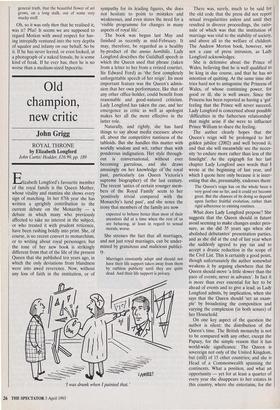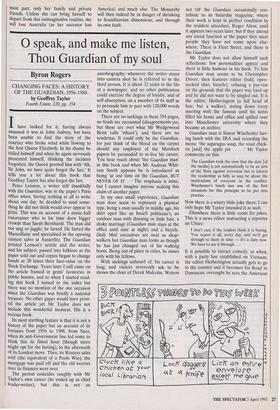Old champion, new critic
John Grigg
ROYAL THRONE by Elizabeth Longford John Curtis! Hodder, £16.99, pp. 189 Elizabeth Longford's favourite member of the royal family is the Queen Mother, whose vitality and stamina she shows every sign of matching. In her 87th year she has written a sprightly contribution to the current debate on the Monarchy — a debate in which many who previously affected to take no interest in the subject, or who treated it with prudent reticence, have been rushing boldly into print. She, of course, is no recent convert to monarchism, or to writing about royal personages; but the tone of her new book is strikingly different from that of the life of the present Queen that she published ten years ago, in which the only deviations from blandness were into awed reverence. Now, without any loss of faith in the institution, or of
sympathy for its leading figures, she does not hesitate to point to mistakes and weaknesses, and even states the need for a `visible programme for changes in many aspects of royal life'.
The book was begun last May and finished as recently as mid-February. It may, therefore, be regarded as a healthy by-product of the annus hornbills. Lady Longford describes the Guildhall speech in which the Queen used that phrase (taken from a letter to her from a retired courtier, Sir Edward Ford) as 'the first completely unforgettable speech of her reign'. Its most important feature was the Queen's admis- sion that her own performance, like that of any other office-holder, could benefit from reasonable and good-natured criticism. Lady Longford has taken the cue, and her emergence as critic as well as apologist makes her all the more effective in the latter role.
Naturally, and rightly, she has hard things to say about media excesses: above all, about the competitive nastiness of the tabloids. But she handles this matter with worldly wisdom and wit, rather than with ponderous indignation. Her style through- out is conversational, without ever becoming garrulous, and she draws amusingly on her knowledge or the royal past, particularly (as Queen Victoria's supreme biographer) of the last century. The recent 'antics of certain younger mem- bers of the Royal Family' seem to her `positively trivial compared with the Monarchy's lurid past', and she notes the irony that members of the family are now
expected to behave better than most of their ancestors did at a time when the rest of us are behaving, at least in regard to sexual morals, worse.
She stresses the fact that all marriages, and not just royal marriages, can be under- mined by gratuitous and malicious publici- ty-
Marriages constantly adapt and should not have their life support taken away from them by ruthless publicity until they are quite dead. And their life support is privacy.
`I was drunk when I painted that.' There was, surely, much to be said for the old code that the press did not report sexual irregularities unless and until they resulted in divorce proceedings, the ratio- nale of which was that the institution of marriage was vital to the stability of society, and above all to the welfare of children. The Andrew Morton book, however, was not a case of press intrusion, as Lady Longford acknowledges.
She is defensive about the Prince of Wales, believing that he is well qualified to be king in due course, and that he has no intention of quitting. At the same time she tries hard not to antagonise the Princess of Wales, of whose continuing power, for good or ill, she is well aware. Since the Princess has been reported as having a 'gut' feeling that the Prince will never succeed, Lady Longford is concerned about possible `difficulties in the father/son relationship' that might arise if she were to influence Prince William to share the feeling.
The author clearly hopes that the Queen's reign will be prolonged to her golden jubilee (2002) and well beyond it, and that she will meanwhile see the neces- sity 'to endure more rather than less of the limelight'. As the epigraph for her last chapter Lady Longford uses words that I wrote at the beginning of last year, and which I quote here only because it is inter- esting that she, presumably, endorses them:
The Queen's reign has on the whole been a very good one so far, and it could yet become great. But the chances of its doing so depend upon further fruitful evolution, rather than rigid adherence to existing routines.
What does Lady Longford propose? She suggests that the Queen should in future avoid seeming to make changes under pres- sure, as she did 35 years ago when she abolished debutantes' presentation parties, and as she did at the end of last year when she suddenly agreed to pay tax and to accept a drastic reduction in the scope of the Civil List. This is certainly a good point, though unfortunately the author somewhat weakens it by arguing elsewhere that the Queen should move 'a little slower than the pace of events; never in advance'. In fact it is more than ever essential for her to be ahead of events and to give a lead; as Lady Longford admits, by implication, when she says that the Queen should 'set an exam- ple' by broadening the composition and varying the complexion (in both senses) of her Household.
On one key aspect of the question the author is silent: the distribution of the Queen's time. The British monarchy is not to be compared with any other, except the Papacy, for the simple reason that it has world-wide significance. The Queen is sovereign not only of the United Kingdom, but (still) of 15 other countries; and she is Head of a Commonwealth spanning the continents. What a position, and what an opportunity — yet for at least a quarter of every year she disappears to her estates in this country, where she entertains, for the most part, only her family and private friends. Unless she can bring herself to depart from this unimaginative routine, she will lose Australia (as her ancestor lost America) and much else. The Monarchy will then indeed be in danger of shrinking to Scandinavian dimensions, and through its own fault.



















































 Previous page
Previous page